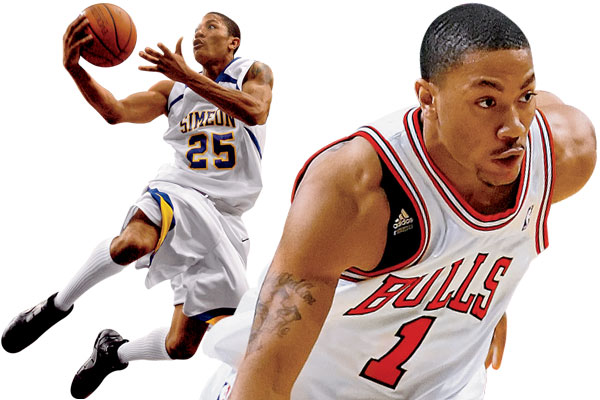
Derrick Rose in 2007 (left), with Simeon Career Academy; with the Bulls in 2010
Related:
THE TIPPING POINT »
From April 2011: How Derrick Rose went from good to great
THE AIR UP THERE »
From November 2008: Rose's leap from inner-city baller to the NBA
The first time I met Derrick Rose, he was sweating through drills at the Berto Center, the Chicago Bulls’ practice facility in Deerfield. It was weeks before the start of his rookie season, in 2008, and Rose was dribbling near the free-throw line, spinning around teammate Joakim Noah, and missing more shots than he made. Rose yelled.
He slammed the ball to the floor.
The Bulls had agreed to let me watch the workout and interview Rose when he finished. Given this shaky performance from the number one pick in the NBA draft, I worried that the team might show me to the door. Naysayers had spent months wondering if the Bulls could have chosen better than Rose, then a 19-year-old point guard who played only one year at the University of Memphis. Was he just another great athlete who couldn’t shoot?
Minutes later, Rose walked off the court, shook my hand, and sat down in a folding chair. We talked about the upcoming season, but barely. Rose was more comfortable remembering Englewood, the South Side neighborhood where he grew up. “I could have gotten trapped,” he said. “But God blessed me.” No matter what happened next, good or bad, Rose had defied the odds: escaping a violent neighborhood, becoming the best college player in the country, and winding up with the Bulls. “It’s like a fairy tale,” I said. Rose smiled. “Not only to y’all,” he replied. “But to me, too.”
Two years later, Rose has been named NBA Rookie of the Year, made the All-Star team, led the Bulls to the playoffs in his first two seasons, and, this past summer, won a gold medal playing with Team USA at the world championships in Turkey. His coach on that team, Mike Krzyzewski of Duke University, told me: “Derrick’s ability to attack both offensively and defensively is special. He’s already one of the elite guards in the NBA.” And all of this was before Rose’s 22nd birthday. No Chicago-born player has ever treated his hometown to this kind of show, which includes leading his high school, Simeon, to consecutive state championships. Just as impressive is that Rose remains much the same: honest and humble, yet self-assured.
One day this fall, I again sat down with Rose in practically the same spot at the Berto Center where we had met two years before. “What have I done?” Rose wondered out loud. “I haven’t done anything yet. I haven’t won any [NBA] championships. I haven’t even made the second round of the playoffs. I’m still chasing.”
The Bulls had just ended practice, and some of Rose’s teammates were still shooting free throws. Though he’d never say so, I was sure he wished he could join them. His practice habits are well known; coaches tell stories about chasing him out of the gym. Basketball has always been his safe haven. When he was growing up, it kept him off the streets. Lately it keeps him away from the crowds. “I’d just rather stay out of the limelight,” he told me. I asked if he ever visited Englewood. His answer was a reminder of how extraordinary his journey has been. “If someone in the neighborhood needs something, I’m only a phone call away,” he said. “That means anything: getting some kid some book bags, [going to] funerals, whatever it is, I’m going to be there.” A few minutes later, Rose was back on the court, making up for lost time.
Photography: (Simeon) Nuccio Di Nuzzo/Chicago Tribune; (Bulls) Dennis Wierzbicki/US Presswire


